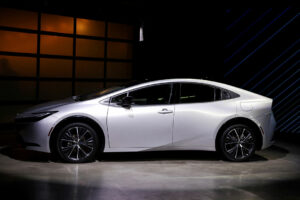
DTI sees Japan FTA talks as possible venue for tariff cuts on hybrid vehicles
THE Department of Trade and Industry (DTI) said that it is open to discussing the expansion of tariff incentives for hybrid vehicles through free trade negotiations with Japan.
“We are open to discuss this under the context of the Philippines-Japan negotiations or the general review of the Philippines-Japan free trade agreement (FTA),” Trade Undersecretary and Board of Investments Managing Head Ceferino S. Rodolfo told reporters on Friday.
Mr. Rodolfo made the remarks after the National Economic and Development Authority (NEDA) said that it will review the extension and expansion of Executive Order (EO) 12 to include e-motorcycles and hybrid vehicles.
Trade Secretary Alfredo E. Pascual said that the agreement in place involves the review of the EO after one year.
“That review is now ongoing. In fact, it has already progressed to the point that we might be able to reach a decision soon. But I cannot pinpoint exactly when because there is still a process of consultation with the other agencies,” he said.
President Ferdinand R. Marcos, Jr. signed EO 12 in February 2023 which imposed zero tariffs on various types of electric vehicle (EV) in order to promote green transport and cut carbon emissions. Prior to the order, tariffs for some EVs had ranged from 5% to 30%.
“The reason why we reduced the tariff on four-wheel pure EVs is to have the critical mass of EVs and make the setting up of charging stations a feasible business,” Mr. Pascual said.
“If we are going to include hybrid vehicles, it will not contribute to the attainment of that objective, as hybrid vehicles do not need charging stations because what charges the batteries of hybrid vehicles is their own internal combustion engine (ICE),” he added.
Mr. Rodolfo said that bringing down the tariff for hybrid vehicles to zero will defeat the purpose of pushing for the 5-year removal of the tariffs.
“The reason why the tariffs were removed is for EVs to enter the market and, in turn, encourage more investment in infrastructure,” he said.
“It is also important to build sufficient levels of market demand to justify domestic assembly. In terms of hybrid vehicles, we are quite far behind when it comes to the supply chain for ICE vehicles, especially if you compare it with our competitive advantage for the EVs, so we really would like to focus on the EVs,” he added.
He said that the Philippines mostly imports its hybrid vehicles from Japan, Thailand, and Indonesia, which are the leaders in the ICE vehicle market.
“Those are where the supply chains for ICE are, so if we bring down the tariffs for hybrid EVs to zero, our imports coming from those countries will go up,” he added.
Mr. Pascual said that hybrid vehicles currently enjoy a 50% deduction on excise tax, which could be to their advantage.
“If you are going to ask us, of course the objective is clear; it is unjustifiable. It is not that we don’t want it; it’s just that we have an objective that we want to realize,” he said.
“But over time, sure. That is why I said it could be, eventually, if there is already a free market. But we have to increase the population of EVs first,” he added.
On Wednesday, the Tariff Commission will be holding a public hearing for the review of the most-favored nation rates of EO 12, including possible expansion of product coverage. — Justine Irish D. Tabile



